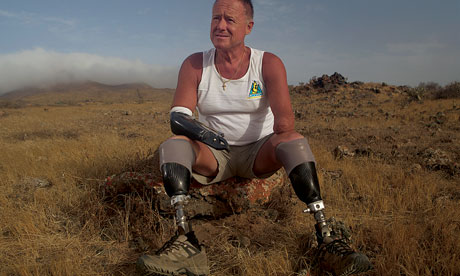
My father brought me up to be a fighter and instilled in me a strong sense that it's possible to get over anything if you put your mind to it. I had a healthy childhood, rarely ill, and by my mid-20s I was working hard as a director for the family building business.
But at around 27, I began to feel tired and achy. When doctors found a lump in my neck, I presumed it was swollen glands. But after further tests I was diagnosed with Hodgkin's disease – cancer of the lymph glands. It was devastating news, but it never entered my head I wouldn't overcome it, and after radiotherapy, chemotherapy and the removal of my spleen, I was given the all clear.
I knew my immune system would be significantly weakened, but life continued much as it had before. I didn't want to become over-anxious. I carried on working, settled down to start a family, and in 1986 my twins were born.
Then, nine months later, I cut my hand removing a manhole cover. I thought little of it. I felt normal for the rest of the day, but the next morning I was so ill I couldn't get out of bed. It turned out the manhole cover hadn't been touched for about a century and was poisonous – within 24 hours, as the toxins started to spread through my system, my body went into shock. I couldn't put any weight on my legs and my hands felt numb. I was rushed to A&E and given drugs to kill the infection.
I was drifting in and out of consciousness when my kidneys began to fail, at which point I was sent to a specialist renal unit. Septicaemia set in and my arms became gangrenous. I was barely aware of what was going on because of the medication; it all felt like a strange out-of-body experience.
Two weeks after I had cut my hand, the specialists agreed that the only way to save my life was to remove all my limbs – I was so ill, my wife had to sign the consent forms. The last thing I remember was the anaesthetist saying, "Everything's going to be all right." My next memory is waking up a few days later and my father telling me that I'd lost my hands and feet.
Hooked up to a dialysis machine, the realisation that I was going to have to spend the rest of my life with no limbs hit hard. I remember saying, "I wished they'd just turned the lights off." While surgeons tried to eradicate the poison from my body, I felt like giving up. They sent a social worker to talk to me, but I refused. I hated everybody and started to put up barriers, shutting out friends, family, even my wife.
At my lowest point, I had a strange compulsion to visit a chapel and found it very comforting, in a contemplative rather than religious way. For whatever reason, my mood shifted. I felt more determined to fight. I returned to the ward and, 24 hours later, my kidneys recovered. Soon after, my blood began coagulating properly, allowing the wounds to heal. The only problem was, I threw so much into my physical recovery, I overlooked the emotional effects of the trauma. When I checked out of hospital three months later, complete with new robotic limbs, I felt devastated all over again.
Everything normal in the house reminded me how different I now was and I fell apart. I knew my life would never be the same again and I didn't know how to deal with it. I was angry and frustrated that I couldn't do the things I'd taken for granted. I lost all sense of purpose and downed drink after drink, until one day I simply thought, "What's the point of carrying on if this is what my life has come to?" I tried to end it all by driving my adapted Jaguar into a tree. Even that failed; the car just threw me on to the side of the road, where I cried like a baby.
After that it was a gradual process of accepting what had happened. My marriage ended and, for a while, the last thing I was looking for was another relationship. I tried to cut down on my business and spend more time setting up my charity to support amputees and their carers.
I'm happily remarried now with two more children, and I've just done a fundraising climb up Mount Kilimanjaro – something I wouldn't have dreamed of taking on when I had all my limbs. Somehow, I feel less daunted by physical challenges. I wouldn't wish my experience on anyone, but I would not change anything that's happened either.
• As told to Nick McGrath.
Do you have an experience to share? Email experience@theguardian.com

